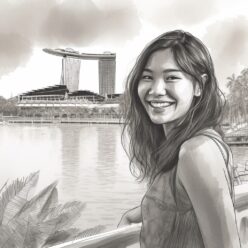“Populism” became a focus of last week’s parliamentary debate on the government’s policy guidelines, and in a rare move, on the final day of the debate, opposition leader Pritam Khaira Singh agreed with Deputy Prime Minister and Finance Minister Lawrence Wong that everyone should say no to populism. Clearly, no politician will admit to pursuing a populist path, so we can only listen to their words and observe their actions.

But what is populism? In the context of parliamentary debates, populism is obviously bad and detrimental to the healthy development of democracy, and therefore unanimously rejected. Tracing its roots, it has various definitions. As used in the general news media today, populism refers to politicians who exploit certain issues to incite public sentiment, oppose those in power (the establishment), and the elite class, in order to gain votes. Therefore, former US President Trump and former Brazilian President Bolsonaro, for example, are populist politicians.
What is populism in the context of Singapore’s recent parliamentary debate? In the past, our understanding of the term was straightforward, referring to politicians who propose various voter-pleasing and sensational ideas, such as free education and healthcare, to win votes. This time, Lawrence Wong provided his own clear definition. He said, “Populism is politics that suppresses, conceals, and falls into post-truth, and twists facts for political gain. It falsely claims that complex issues have simple solutions when that is not the case. If populism takes root in Singapore, parties implementing populist policies may gain some short-term benefits, but in the long run, it will cause great harm to Singapore and Singaporeans.”
He went on to say, “As far as the government is concerned, our position is very clear. We reject all forms of populism and uphold honesty and integrity when formulating policies. If the government does not meet these standards, we expect the opposition to point it out. Please do so. You must do so. We expect you to do so. Conversely, if the opposition proposes ideas and policies that we consider populist, we will also point out and emphasize our concerns, as we should. I hope this is our consensus on how to advance Singapore’s political and democratic development.” Pritam Khaira Singh immediately expressed agreement. This is an important reference point for “observing their actions.”
In fact, Lawrence Wong expressed this expectation on the first day of the debate. He hoped that during this debate and for the remainder of the current government’s term, the opposition would propose realistic alternative policy options, rather than opportunistic or populist ideas that slowly erode public trust in the government, and should instead present rigorous alternative guidelines as a potential alternative government.
The so-called gradual erosion of public trust in the government, or “salami slicing” in popular terms, is a powerful political tactic, as it operates in the gray area. It is not easy to label it as populist. For example, if you say that the government should only use half of the net investment income contribution from reserves, and someone else asks why not use 60%, it may be debatable whether this is populist, but it is definitely “salami slicing” and can easily win voters’ hearts. Similarly, if you insist on raising the consumption tax, others may argue for raising taxes on the wealthy or corporations instead, which could also win over some voters.
The most deadly aspect is the amplification effect of social media, which makes “salami slicing” tactics even more potent. Because one person can form a cyber army, stirring up noise for various opposing voices. However, Pritam Khaira Singh did not take the bait to Lawrence Wong’s direct attack but adopted a temporary avoidance strategy, admitting that the Workers’ Party is not yet able to form an
alternative government and expressed the desire to continue learning and growing. He also emphasized that the Workers’ Party’s goal is to provide constructive feedback and to ensure that the government is held accountable.
In this debate, both the government and the opposition agreed to reject populism, emphasizing the need for responsible and honest policy-making. This consensus is crucial for Singapore’s political and democratic development. As citizens, we must not only listen to politicians’ words, but also observe their actions, to ensure that they are adhering to the principles they claim to uphold.
Going forward, it is crucial to maintain a healthy political environment in Singapore, where parties and politicians focus on substantive policy discussions and strive to provide pragmatic solutions to the challenges faced by the nation. In this way, Singapore’s political landscape can continue to mature and evolve, ensuring that the country remains resilient in the face of a rapidly changing global environment.
